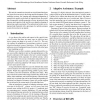Free Online Productivity Tools
i2Speak
i2Symbol
i2OCR
iTex2Img
iWeb2Print
iWeb2Shot
i2Type
iPdf2Split
iPdf2Merge
i2Bopomofo
i2Arabic
i2Style
i2Image
i2PDF
iLatex2Rtf
Sci2ools
KI
2002
Springer
2002
Springer
Empirically Grounded Decision-Theoretic Adaptation to Situation-Dependent Resource Limitations
This article summarizes research on several interrelated general issues that can arise in the design and development of user modeling systems: the learning and subsequent adaptation of general user models on the basis of empirical data; the modeling of temporally variable properties of users, in particular time pressure and cognitive load; and the user-adaptive planning of interactions under uncertainty. The methods and results are integrated and illustrated with a prototype of a mobile assistance system for travelers in an airport.
Artificial Intelligence | General User Models | Interrelated General Issues | KI 2002 | User Modeling Systems |
| Added | 22 Dec 2010 |
| Updated | 22 Dec 2010 |
| Type | Journal |
| Year | 2002 |
| Where | KI |
| Authors | Thorsten Bohnenberger, Boris Brandherm, Barbara Großmann-Hutter, Dominik Heckmann, Frank Wittig |
Comments (0)

